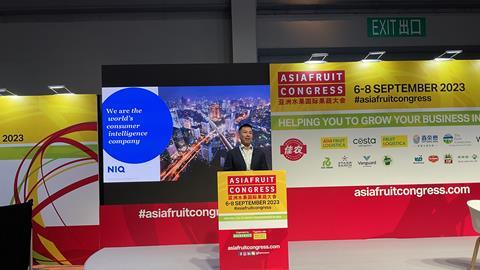Growth in online grocery sales is slowing post-pandemic as Asian shoppers seek more convenient, as well as sustainable products
Inflation, convenience and sustainability are the three key trends shaping the Asian retail sector this year, delegates at the Asiafruit Congress have heard.
Edwin Sun from NIQ (formerly Nielsen IQ) spoke on the first day of this year’s Asiafruit Congress in Hong Kong, discussing the current and future market for food retail on the continent. He gave a detailed outline of the current headwinds facing the sector, and in particular the impact of inflation, which while slower at six per cent than the western world, is still having a significant impact on consumers.
Sun was joined on stage by Yang Qian of Pagoda, who gave an account of the Chinese retailer’s latest developments, and Jose Vottero of Fresh Fruit-X, who outlined the current state of the market from the supplier’s perspective.
Tough consumer picture
Shopper research by NIQ reveals that in the Asia-Pacific (APAC) region, some 61 per cent of consumers believe they are already living in a recession, with 27 per cent having only enough cash to afford food, shelter and basic goods. A third said they plan to spend less on out-of-home dining, but crucially, in good news for fresh produce 45 per cent of consumers indicated they are willing to spend more on fruit and vegetables as the focus switches to home cooking.
Similar trends are being seen at retail in the APAC region as in Europe, with shoppers switching to discounters, stripping back their purchases and showing less loyalty to individual supermarkets, Sun said.
Changing trends online
With the pandemic now considered over, convenience is once again a growing trend, while online shopping is not seeing the same level of growth as in recent years. Smaller-store formats are benefiting from the drive for convenience, with minimarkets expanding by between 15-18 per cent in Malaysia, Indonesia, Vietnam and the Philippines.
There is a huge range in the extent of e-commerce’s market share across Asian markets, however. In South Korea and China it holds a sizeable 35.5 and 30.4 per cent share respectively, whereas in Thailand, Indonesia and India it is just 2.3 per cent or less. The online share is 15.3 per cent in Singapore.
Aside from 3.6 per cent growth in South Korea, however, in the past year none of those other markets have seen online growth of more than 1.1 per cent.
“Now is a time to rethink the symbiotic relationship between online and offline,” said Sun. “The balance is very important and you need to understand what kind of products consumers are looking for online.”
One area of potential growth in e-commerce is in fresh fruit and vegetables, which in Singapore is the number-one category that triggers online grocery shopping, according to NIQ. In that same country, there was a 95 per cent increase in online fruit and veg sales last year, while that figure is a stratospheric 174 per cent in Hong Kong.
Sustainable focus
While sustainability might have traditionally been less important to the Asian consumer, that is starting to change, according to Sun. It might still only be the fourth most important sales driver behind price, food safety and healthy eating, but as many as 41 per cent of APAC consumers surveyed said sustainability is “much more important to them” than it was two years ago.
“It’s important for retailers to have cheaper own-label options with sustainability [credentials],” Sun noted, adding that it is no longer something that is considered merely a premium requirement.
On the subject of sustainability, Vottero added that climate change is necessitating strategies that consider different origins, in order to address the difficulties that are presented by the weather.
Creating value
Looking at how world retail trends are being seen in Asia, Vottero said that one of the most notable areas is the greater use of theatre to elevate brands in stores, with Asian retailers often outperforming their European counterparts in this respect. Upscale supermarkets are particularly inspiring shoppers with their store design and wide range of high-quality products, he pointed out.
Vottero also stressed that creating value, rather than focusing simply on cost, must be the way forward, with an emphasis on cultivating loyalty, and learning and adapting from best-in-class examples from around the world.




